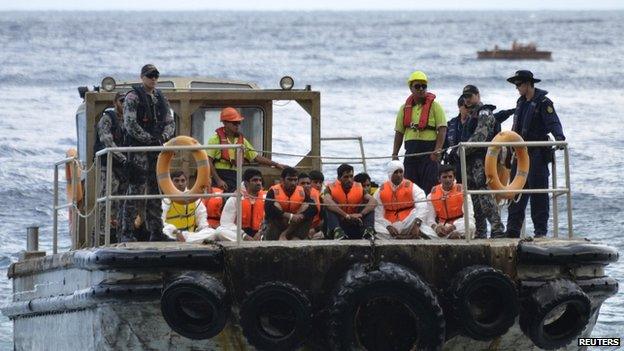Australia PM defends 'tough' asylum policy amid abuse claims
- Published
Footage from ABC appears to show a lifeboat of asylum seekers being towed by an Australian vessel
Australia's prime minister said tough new asylum policies were "working", as new footage appeared to show asylum seekers being towed back to Indonesia.
Tony Abbott said no illegal boats had reached Australia in the last 50 days.
Meanwhile, a newspaper published an interview with a man who said he witnessed navy personnel abusing asylum seekers last month.
Government ministers have strongly denied the abuse claims and criticised coverage of the reports.
On Friday, Australian broadcaster ABC, external published footage of what appeared to be a lifeboat of asylum seekers being towed by an Australian vessel.
It is thought to be a lifeboat that arrived on the coast of Java on Wednesday, external, ABC said.
It comes after media reports said the government had bought lifeboats for the purpose of transporting asylum seekers back to Indonesia.
Indonesian Foreign Minister Marty Natalegawa said: "This kind of policy of transferring people from one boat to another and then directing them back to Indonesia is not really helpful."
The government has refused to comment on reports of the lifeboats and tow-backs. It has however recently issued an apology to Indonesia for "inadvertently" violating its waters on multiple occasions.
Indonesia serves as a transit point for people-smugglers, who ferry asylum seekers to Christmas Island, the closest part of Australian territory, on rickety and over-crowded boats.

Asylum seekers often head for Christmas Island via Indonesia
Speaking on Friday, Mr Abbott said: "I'm pleased that we've now had 50 days without an illegal boat arriving in Australia and the message is getting out loud and clear to the people smugglers and their would-be customers that the way is shut."
"These policies are working," he added. "Yes they are tough, but they are working."
'Public interest'
Meanwhile, Fairfax media, external published an interview with an asylum seeker who said he witnessed the abuse of three asylum seekers by navy staff, during a tow-back operation in early January.
Yousif Ibrahim Fasher told Fairfax media the asylum seekers burned their hands after they were forced to hold a hot exhaust pipe on the boat as a punishment for protesting about access to the toilet. His account has not been corroborated by the three men, who he said were too scared to talk.
Immigration Minister Scott Morrison said on Thursday that the allegations were "malicious and unfounded slurs" made against the navy.
"The government... rejects outright any allegations of unprofessional conduct by our people serving in Operation Sovereign Borders," he added.
The abuse claims, and the way they have been covered, have generated considerable controversy.
ABC reported, external on the allegations on 22 January, showing footage of asylum seekers being treated for burns on their hands.
Indonesian police confirmed that some asylum-seekers had burn marks on their hands. However, it remains unclear how the burns were incurred.
The abuse claims were strongly rejected by both the Australian military and government. Mr Abbott also criticised the ABC's coverage of the claims, saying it was not "fair, balanced" or "accurate".
In a statement this week, external, ABC's managing director and news director said the wording of the report should have been "more precise".
"[We] regret if our reporting led anyone to mistakenly assume that the ABC supported the asylum seekers' claims," the statement said.
"The ABC has always presented the allegations as just that - claims worthy of further investigation," the statement said, adding that the story remained "in the public interest".
Defence Minister David Johnston said on Friday that the navy had been "maliciously maligned" and said he was angry that an "Australian iconic news agency [ABC] would attack the navy the way that it has".
Critics have accused the government of secrecy over asylum policy.
On Friday, Mr Abbott said the government would not release footage of the navy's operations to intercept asylum seekers, saying it "might complicate the task of stopping the boats".
However, opposition leader Bill Shorten said the government was "hiding behind" the military.
"What we need here is to forget the secrecy," he said. "The Australian people will give a fair bit of slack to governments provided they are up front with the Australian people".
- Published29 January 2014
- Published23 January 2014
- Published21 January 2014
- Published9 January 2014